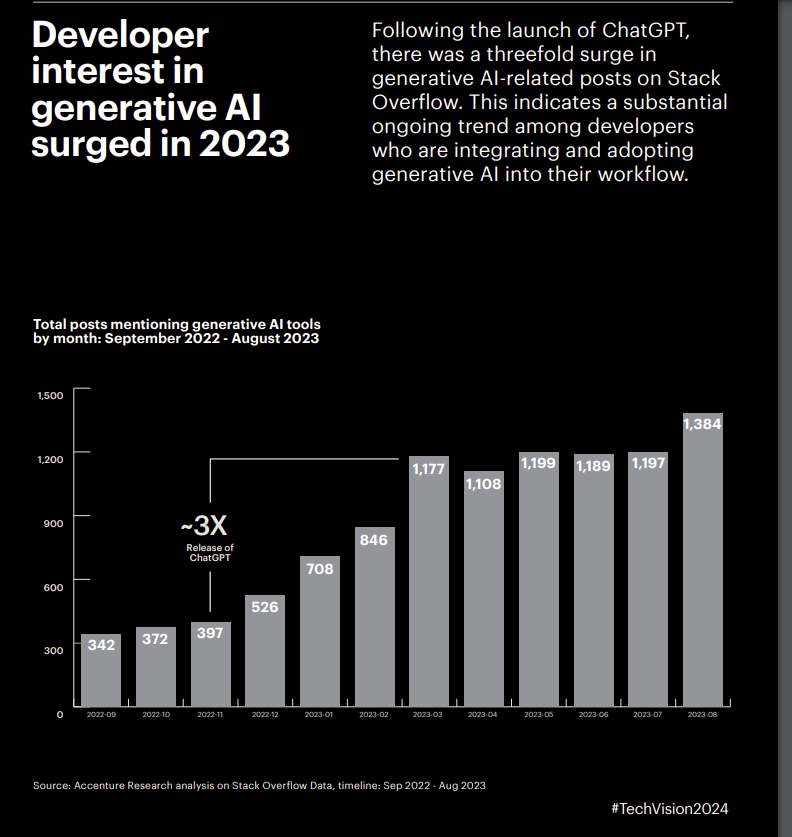Technologies such as artificial intelligence, spatial computing and body-sensing innovations will become more human-like, omnipresent, and almost invisible, according to Accenture's Technology Vision 2024.
The report, penned by Accenture Chief Technology and Innovation Officer Paul Daugherty and team, argued that generative AI and other technologies will be more human. This more human-like AI will make them easier to interact with and enable people to amplify themselves.
Daugherty, a frequent DisrupTV guest, said the change brought by AI, spatial computing and body-sensing technologies will create a "seismic shift in the way people work, live and learn will accelerate a wave of unprecedented change across industries, from retail and entertainment to medicine and manufacturing."
Accenture's Paul Daugherty: Generative AI today, but watch what's next | Daugherty DisrupTV appearances: 2023, 2022, 2021, 2020
He argued that enterprises need to reinvent their businesses to account for "human by design" technologies. From the report:
"We are about to see a massive expansion of every industry. Think of it like this: in the 1700s, the industrial revolution made creating physical things easier, and in turn refaced the way our world works and how we live in it. Now, as technology becomes more human, it becomes easier to work with – and will spark an infusion of technology through every dimension of the business. We are already seeing its impact on our ability to create. Recent innovations have led to an explosion of digital art, music, and product designs. And technology that is human by design is also introducing brand-new possibilities – digital helpers like AI agents, or digital spaces where we can build and create even in ways that break the laws of physics. By building fundamentally intuitive bridges between people and the most advanced technologies of our age, productivity and value creation are poised to grow exponentially across every industry."
The report cites four primary human by design trends:
AI will reshape human relationships with knowledge. Accenture said data will be reorganized to facilitate human-like reasoning. Instead of today's search, you'll get curated responses and advice. Searching will become synthesizing and enterprises that equip their people with AI-enhanced knowledge will see competitive advantage.
My take: This trend is already in play and you're seeing it in your Google search results and bevy of copilots across applications. For enterprise knowledge, however, the game is just getting started. It remains to be seen how much data architecture work needs to be done to make this trend more enterprise friendly.
Ecosystems for AI and AI empowered agents. Accenture predicted that AI agents will work on behalf of individuals as part of a broader ecosystem. The agents will advise, assist and take actions in physical and digital worlds. This automation will be a big opportunity for enterprises over the next three years.
My take: What Daugherty and team lay out is the automation dream where industries create value chains to carry out work and execute and refine processes on the fly. For one company, the AI-powered automation effort can drive huge returns. Automation across a value chain really drives returns.

Spatial computing will fuse digital and physical worlds. Here Accenture said that spatial computing, metaverse, digital twins and AR/VR will drive new experiences and revamp how we work, live and learn.
My take: The debate about spatial computing is really one about timing more than technology. The industries that can leverage spatial computing the most--retail and media for instance--have the thinnest margins to invest. All eyes will go to Apple Vision Pro for spatial computing popularity.
- Constellation ShortList™ Metaverse Worlds
- Monetizing the Metaverse Economy
- Constellation ShortList™ Metaverse Development Platforms
- Constellation ShortList™ Metaverse Design and Services
- A CX Warning: The Metaverse Won't Be as Forgiving as Web 2.0
Human interface technologies. Accenture said AI-powered wearables, brain-sensing neurotech and eye and movement tracking will enhance work and life. The idea is that human interface technologies will bring new interactions and understanding.
My take: The human interface technologies are popping up a lot at healthcare conferences as well as CES. In healthcare, these technologies will lead to better outcomes. Don't expect a consumer-led human interface revolution though.


